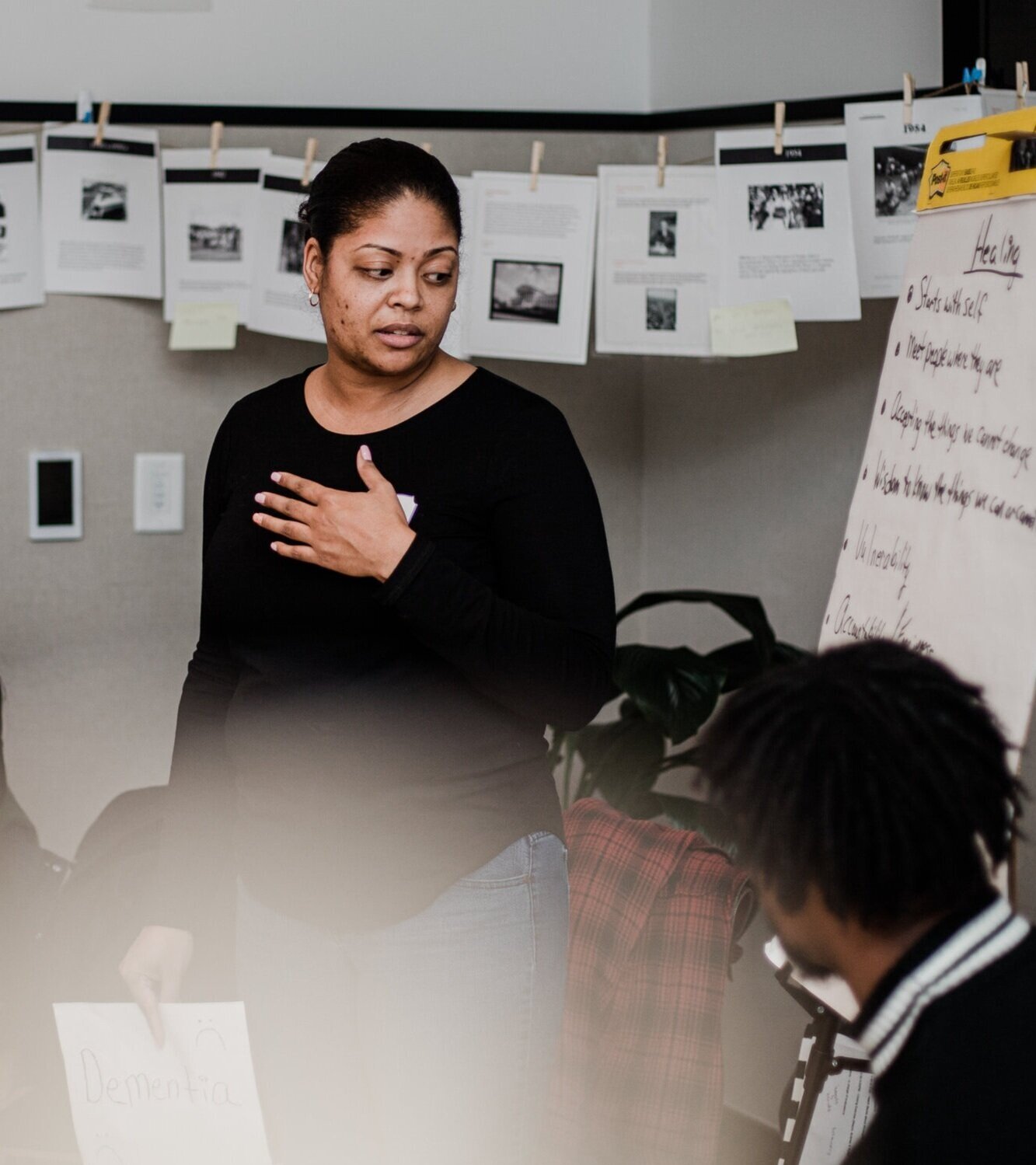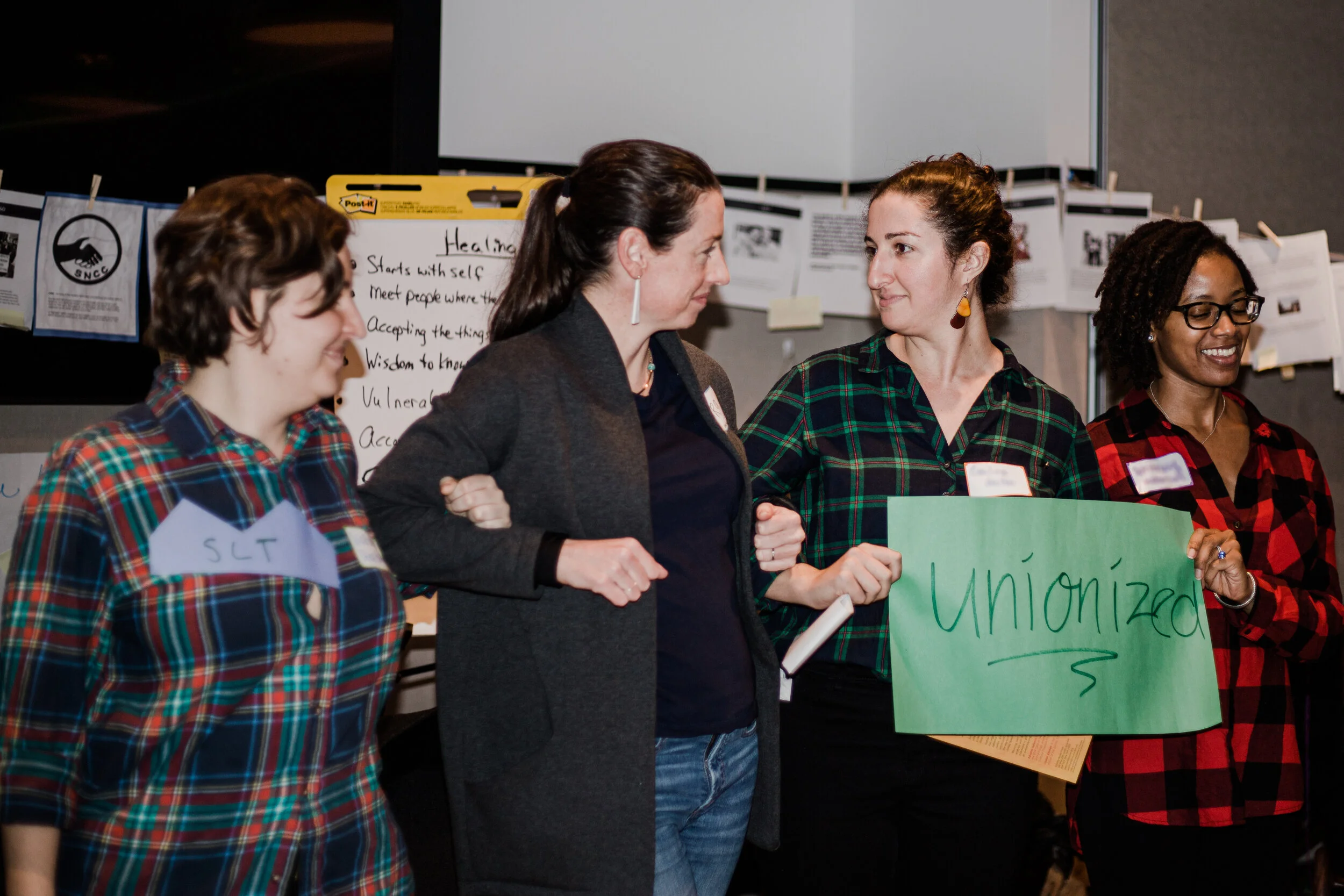Our Method
Why us?
S2J offers trainings and strategies for advocates, service providers, organizers, and org leaders designed by people who have been service providers, have received services, are advocates and organizers, and lead organizations.
Our experience has taught us that antiracist organizations must think critically about repairing harm, creating opportunities for healing, thinking imaginatively around solutions, and then acting to manifest them.
Our Guiding Principles
S2J grounds its work in four basic principles for building antiracist organizations: reparations, healing, imagination, & movement.
These are the cornerstones that form the basis of our liberation theory and inform the design of our Rooting Out Racism training. We guide folks through engaging with this framework intellectually, emotionally, and kinesthetically during our time together.
The How & Why of Our Method
Personalized and Emergent
S2J tailors each workshop to the organization and individuals we are offering it to at any given moment. There is no one-size-fits-all model of transformation; we explore client needs and actively design responsive interventions (including during real-time interactions). This way, you develop the analysis, skills, and tools most relevant and helpful to you at your unique stage in the process.
Arts-infused
Transformation requires that we engage in earnest self-reflection, try out different ways of expressing ourselves, and create new kinds of relationships with others. We are skilled at using both our intellect and language (through talking, writing, or signing) to navigate our day-to-day lives. We are so good, in fact, that we can use language as a defense mechanism during challenging situations without even realizing it (for instance, to withhold insecurities or to protect ourselves from a hard truth). As much as it can lubricate connection, language can also be a barrier to deeper understanding when we rely on it as our sole source of communion with ourselves, with others, and with the theory and practice of antiracism.
As skillful art therapists, social workers, artists, and organizers, we understand that creating art can help folks increase awareness of self and others, process feelings, experience joy, build frustration tolerance, and engage multiple areas of the mind, heart, spirit, and body. S2J integrates art-making, writing, music, drama, and movement into our workshop to invite participants to engage with the theory and praxis of antiracism/anti-oppression in more profound ways. There is science behind how art and music help to make new neural pathways in our brains (which is an important part of learning and behavioral change)! Art-based practices combined with an understanding of human and organizational development, group
process and theory, and healing modalities widen the spectrum of possibility for our collective transformation. Our registered art therapist is trained to adapt our arts directives for folks with different physical and cognitive abilities and sensitivities.
ROR participants using markers to create antiracist visions for their respective organizations.
Body, Spirit, & Culture-based
Though we can often name that racism is systemic and pervasive, it can be more challenging to understand the extent to which racial oppression actively harms our bodily, spiritual, and cultural lives. Healers have made it clear that, in order to transform our societies, we must reconceptualize what it means to be human beings. S2J knows that antiracism work is also spiritual work and that as we create cultural change within our organizations, we must be in touch with what our bodies have to teach us, tune into what legacies of ancestral wisdom have to say, and seek to embody anti-oppression in ways that go beyond busying our minds with reading and study. During ROR, we invite participants to reflect on and invite in their cultural histories. We offer breathing exercises as grounding practices. We invite folks to move in response to the material in the ways that feel good for their individual bodies. S2J designs our spaces for whole-person activation.
Community Organizing + Popular Education
ROR participants act out a skit about power dynamics and belonging in organizations.
A core element of antiracism and equity work is the redistribution of power and resources so that everyone has what they need to thrive. It also demands disrupting the hierarchical and oppressive structures that deem some people more valuable, worthy, fit, or capable than others. We borrow principles and techniques of community organizing to help ROR participants understand power, recognize resources, examine their role as gatekeepers, and take collective action for change.
We often use popular education practices to curate opportunities for collective knowledge creation and insight, further disrupting the idea that the facilitator/trainer/educator/person in power knows the most. S2J honors that lived experience is a form of expertise, and that everyone has insight to offerand/or questions that contribute to our process.
More about How We Work
We understand that history is a bridge for understanding the importance of repair and use the tool as a foundation for guiding participants to think through redistribution of wealth, power, and access within organizations.
We uplift the power of transformative relationships.
We seek to help organizations cultivate a culture of radical honesty that allows folks to navigate unaddressed racialized harm and conflict between them, within the community, and/or within the history of the work.
We give participants tools for designing healing spaces in their organizations, and create space for healing to begin while people are together during our trainings.
We guide participants through identifying the ways that racism and dominant culture manifests in organizations. We then invite them to create visions for anti-racist organizations.
We underscore the importance of collective actions, advance the critical work of partnering with impacted peoples, give support around building a change team, and lead participants through the process of crafting an anti-racist strategy that aligns with org missions, timelines, capacity, etc.
We allow space for the full spectrum of human emotions and experiences.




